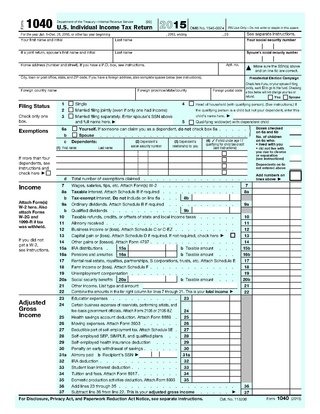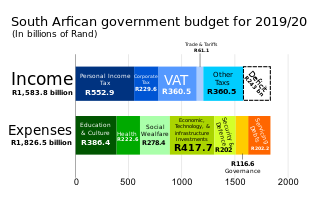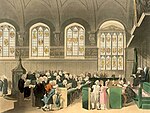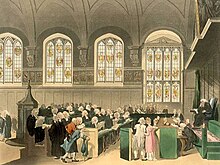An expense is an item requiring an outflow of money, or any form of fortune in general, to another person or group as payment for an item, service, or other category of costs. For a tenant, rent is an expense. For students or parents, tuition is an expense. Buying food, clothing, furniture, or an automobile is often referred to as an expense. An expense is a cost that is "paid" or "remitted", usually in exchange for something of value. Something that seems to cost a great deal is "expensive". Something that seems to cost little is "inexpensive". "Expenses of the table" are expenses for dining, refreshments, a feast, etc.
A tax deduction is an amount deducted from taxable income, usually based on expenses such as those incurred to produce additional income. Tax deductions are a form of tax incentives, along with exemptions and tax credits. The difference between deductions, exemptions, and credits is that deductions and exemptions both reduce taxable income, while credits reduce tax.
A capital gains tax (CGT) is the tax on profits realized on the sale of a non-inventory asset. The most common capital gains are realized from the sale of stocks, bonds, precious metals, real estate, and property.

The United States federal government and most state governments impose an income tax. They are determined by applying a tax rate, which may increase as income increases, to taxable income, which is the total income less allowable deductions. Income is broadly defined. Individuals and corporations are directly taxable, and estates and trusts may be taxable on undistributed income. Partnerships are not taxed, but their partners are taxed on their shares of partnership income. Residents and citizens are taxed on worldwide income, while nonresidents are taxed only on income within the jurisdiction. Several types of credits reduce tax, and some types of credits may exceed tax before credits. Most business expenses are deductible. Individuals may deduct certain personal expenses, including home mortgage interest, state taxes, contributions to charity, and some other items. Some deductions are subject to limits, and an Alternative Minimum Tax (AMT) applies at the federal and some state levels.
Capital gains tax (CGT), in the context of the Australian taxation system, is a tax applied to the capital gain made on the disposal of any asset, with a number of specific exemptions, the most significant one being the family home. Rollover provisions apply to some disposals, one of the most significant of which are transfers to beneficiaries on death, so that the CGT is not a quasi estate tax.
1231 Property is a category of property defined in section 1231 of the U.S. Internal Revenue Code. 1231 property includes depreciable property and real property used in a trade or business and held for more than one year. Some types of livestock, coal, timber and domestic iron ore are also included. It does not include: inventory; property held for sale in the ordinary course of business; artistic creations held by their creator; or, government publications.
Basis, as used in United States tax law, is the original cost of property, adjusted for factors such as depreciation. When a property is sold, the taxpayer pays/(saves) taxes on a capital gain/(loss) that equals the amount realized on the sale minus the sold property's basis.
Under Section 1031 of the United States Internal Revenue Code, a taxpayer may defer recognition of capital gains and related federal income tax liability on the exchange of certain types of property, a process known as a 1031 exchange. In 1979, this treatment was expanded by the courts to include non-simultaneous sale and purchase of real estate, a process sometimes called a Starker exchange.
A charitable remainder unitrust is an irrevocable trust created under the authority of the United States Internal Revenue Code § 664 ("Code"). This special, irrevocable trust has two primary characteristics: (1) Once established, the CRUT distributes a fixed percentage of the value of its assets to a non-charitable beneficiary ; and (2) At the expiration of a specified time, the remaining balance of the CRUT's assets is distributed to charity. The trustee determines the fair market value of the CRUT's assets at the time of contribution and thereafter on the applicable valuation date. The fixed annuity percentage must be at least 5% and no more than 50% of the fair market value of the assets in the corpus. The remainder must be at least 10% of the fair market value of the assets contributed to the CRUT. Code Section 664(d)(1) sets the federal income tax requirements for a charitable remainder unitrust.
In the United States, individuals and corporations pay a tax on the net total of all their capital gains. The tax rate depends on both the investor's tax bracket and the amount of time the investment was held. Short-term capital gains are taxed at the investor's ordinary income tax rate and are defined as investments held for a year or less before being sold. Long-term capital gains, on dispositions of assets held for more than one year, are taxed at a lower rate.
Taxpayers in the United States may have tax consequences when debt is cancelled. This is commonly known as cancellation-of-debt (COD) income. According to the Internal Revenue Code, the discharge of indebtedness must be included in a taxpayer's gross income. There are exceptions to this rule, however, so a careful examination of one's COD income is important to determine any potential tax consequences.
Depreciation recapture is the USA Internal Revenue Service (IRS) procedure for collecting income tax on a gain realized by a taxpayer when the taxpayer disposes of an asset that had previously provided an offset to ordinary income for the taxpayer through depreciation. In other words, because the IRS allows a taxpayer to deduct the depreciation of an asset from the taxpayer's ordinary income, the taxpayer has to report any gain from the disposal of the asset as ordinary income, not as a capital gain.

The Foreign Investment in Real Property Tax Act of 1980 (FIRPTA), enacted as Subtitle C of Title XI of the Omnibus Reconciliation Act of 1980, Pub. L. No. 96-499, 94 Stat. 2599, 2682, is a United States tax law that imposes income tax on foreign persons disposing of US real property interests. Tax is imposed at regular tax rates for the taxpayer on the amount of gain considered recognized. Purchasers of real property interests are required to withhold tax on payment for the property. Withholding may be reduced from the standard 15% to an amount that will cover the tax liability, upon application in advance of sale to the Internal Revenue Service. FIRPTA overrides most nonrecognition provisions as well as those remaining tax treaties that provide exemption from tax for such gains.

Byram v. United States, 705 F.2d 1418 is a Fifth Circuit Court of Appeals decision that helps determine when a sale of land will result in a capital gain for purpose of the U.S. Federal income tax.
Arkansas Best Corporation v. Commissioner, 485 U.S. 212 (1988), is a United States Supreme Court decision that helps taxpayers classify whether or not the sale of an asset is an ordinary or capital gain or loss for income tax purposes.
Section 165(c) of the United States Internal Revenue Code limits losses that taxpayers can deduct into three categories: business or trade losses, investment losses, and losses incurred from casualty or theft. A loss incurred by a taxpayer from the sale of the taxpayer's personal residential property is not deductible. Personal residential property losses do not fit under any of the enumerated categories under Internal Revenue Code section 165(c). Furthermore, Income Tax Treasury Regulation section 1.165-9 states that a loss sustained on the sale of residential property purchased or constructed by the taxpayer for use as his personal residence and so used by him up to the time of the sale is not deductible under Internal Revenue Code section 165(a).
A like-kind exchange under United States tax law, also known as a 1031 exchange, is a transaction or series of transactions that allows for the disposal of an asset and the acquisition of another replacement asset without generating a current tax liability from the sale of the first asset. A like-kind exchange can involve the exchange of one business for another business, one real estate investment property for another real estate investment property, livestock for qualifying livestock, and exchanges of other qualifying assets. Like-kind exchanges have been characterized as tax breaks or "tax loopholes".

Taxation may involve payments to a minimum of two different levels of government: central government through SARS or to local government. Prior to 2001 the South African tax system was "source-based", where in income is taxed in the country where it originates. Since January 2001, the tax system was changed to "residence-based" wherein taxpayers residing in South Africa are taxed on their income irrespective of its source. Non residents are only subject to domestic taxes.
Corn Products Refining Company v. Commissioner, 350 U.S. 46 (1955), is a United States Supreme Court decision that helps taxpayers classify whether or not the disposition of a commodity futures contract by a business of raw materials as part of its hedging of business risk is an ordinary or capital gain or loss for income tax purposes.
An Opportunity Zone is a designation and investment program created by the Tax Cuts and Jobs Act of 2017 allowing for certain investments in lower income areas to have tax advantages. The purpose of this program is to put capital to work that would otherwise be locked up due to the asset holder's unwillingness to trigger a capital gains tax.





